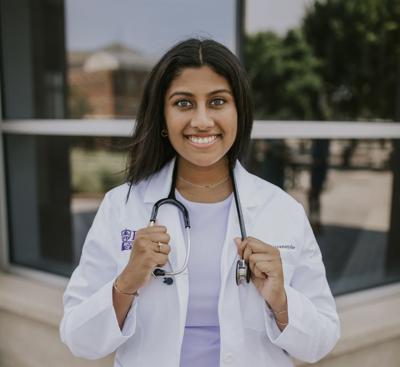October 21, 2023. The Daily Reflector.

Ms. Loretta is a 72-year-old woman with diabetes who lives with two generations of family members. Last year, my “Pineapple Carrot Muffins” earned a spot at her Thanksgiving table — the highest honor in a rural Southern community. Picture this: muffins with no added sugar. No butter. No oil. Sugar-free applesauce. Lots of carrots. While my recipe is not as rich as the infamous, calorie-ridden carrot cake, the muffins are nonetheless moist and delicious. So, how did my nutritious recipe infiltrate the Thanksgiving spread? The answer lies in this simple premise: Connections built on trust are the foundation of patient-centered care.
A growing body of neuroscience research suggests that our brains are hardwired to connect with each other. In fact, community is as necessary as food and water, as evidenced by successful societies of past and present. An exchange in energy that both requires and delivers genuine attention has the power to comfort, inspire new thought patterns, build trust, and even heal. Why, then, is connection not always prioritized in patient-physician interactions?
According to the American Academy of Family Physicians, there is an association between patient-centered approach to care and greater treatment adherence and improved health outcomes. These findings were exemplified when I led healthy cooking classes for older adults with food insecurity in eastern North Carolina as a medical student and North Carolina Schweitzer Fellow. My fellowship partner, Julianna Roupas, and I were often approached after the weekly classes to receive feedback from our participants, like Ms. Loretta. In one such instance, a participant expressed that she was one blood test away from a chronic diagnosis and that our in-person classes motivated her to make healthier choices. As we got to know the participants, we were able to tailor the classes to meet their needs. Taking the time to learn the vulnerable details of their lives mattered. The evidence? Each week, participants eagerly shared how they implemented the previous week’s lesson, including swapping soda for water and fast food for home-cooked meals.
In a fee-for-service medical system, it is easy to get caught up in seeing “X” number of patients in a day — especially when a physician’s livelihood depends on it. But it is essential to balance business with humanity. According to a “Future of Care” study published in JAMA, failure to coordinate care leads to $25 billion-45 billion each year in wasteful spending that then leads to increased complications, hospital admissions, and disabilities among chronically ill patients. Increased face-to-face time with patients makes little difference if there is a lack of a strong, trusting relationship with patients; the humanistic side of medicine is vital to patients’ adherence and long-term well-being.
Both future and current providers need to rethink the way they operate within the current health system structure and, both, re-distribute budgets and re-invest time in a patient-centered manner. Physician leaders can shift the culture of current practices by partnering with administration to build a lasting patient-centered approach. It will take resources, teamwork, patience, and a communal embracement of change to better advance the health of the patients we serve.
Change is never easy, but investing in efforts that benefit patients more than our pockets will be more successful in ensuring wellness— that of patients and physicians alike. I look forward to being a part of a team that prioritizes patient-physician relationships and fosters an environment where no patient feels confused about their care. Investing in such relationships will not only enhance the healing process but also breathe purpose into our professional lives. I look forward to continuing to earn a metaphorical spot at the Thanksgiving table that is my patients’ lives. I implore you to do the same.
Manthi Dissanayake is a student at the Brody School of Medicine at East Carolina University and a 2022-23 N.C. Schweitzer Fellow.
